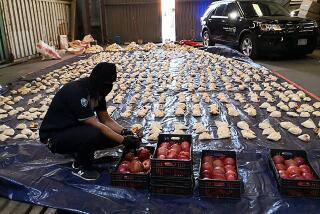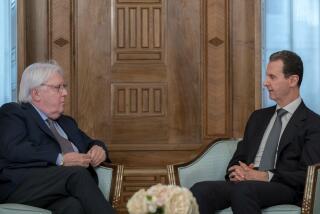President Bashar Assad blames conspiracies for Syria unrest
Reporting from Cairo â Invoking the steely determination of his brutal father, President Bashar Assad blamed foreign conspiracies for Syriaâs unrest in a highly awaited speech Wednesday that sought to brace his familyâs 40-year dynasty against a rebellion similar to those that have left governments reeling across the Middle East and North Africa.
It was to have been a defining moment for a president confronting a revolt in the provinces and power struggles within his inner circle. But Assad, who has cast himself as both a visionary and the tough son of his late father, Hafez, made no dramatic promises and refused to lift a longstanding emergency law limiting civil liberties as a concession to end nearly two weeks of bloodshed.
The speech instead alluded to well-worn charges of conspiracy, media distortion and the hidden hand of Israel for sparking uprisings that have resulted in security forces killing more than 60 protesters. Assad said the reforms that demonstrators are demanding, including the end to the emergency law and wider political freedoms, were among existing proposals that may be passed later this year.
That vagueness epitomizes the strategy of leaders across the region who have struggled to hang on to power, some more successfully than others, against waves of protest. Former Egyptian President Hosni Mubarak sent out a flurry of hazy pledges for reform days before he was forced to resign. Yemen President Ali Abdullah Saleh is taking a similar approach as calls intensify for him to step down.
But perhaps more so than some of its neighbors, Syria suffuses its politics with intrigue. As he spoke, Assad sounded like a spymaster spinning scenarios of foreign interlopers, voicing suspicion and leveling derision on Israel and the U.S. However, he did not identify any specific plots, except to say that conspirators were communicating through phone texting.
âSyria is a target of a big plot from the outsideâŚ. Its timing, its format has been speeded up,â Assad said as Syrians gathered around television sets at homes and in town squares. He said some protesters have been âdupedâ into taking to the streets.
âI had the feeling I was listening to his father. Nothingâs changed,â said Randa Habib, a Jordanian writer and political analyst. âItâs as if weâre in an era of 30 years ago when Israel was to blame for everything. I think these dictators in the region must go to the same school. He was arrogant, cut off from reality.â
When he mentioned reforms, Assad, 45, said he had been pushing for them since he succeeded his father, who seized power in 1970 and led Syria until his death in 2000.
Many Syrians, at that time, believed that Bashar Assad, a British-educated eye doctor, would bring a freer, more politically open era. But Assad told the nation Wednesday that regional turmoil, including wars in Iraq and Lebanon, had slowed the pace of change.
âThere are no hurdles to reforms, but there are delays,â said Assad, who received a standing ovation when he entered the parliament. He acknowledged that the Syrian people do have legitimate âdemands that have not been metâŚ. Sometimes we failed in marketing our ideas.â
Referring to revolutions this year in Egypt and Tunisia, he said, âIf we stay without reform we are on the course of destruction.â
But he offered no details and did not, as many were anticipating, repeal the emergency law that has kept his Baath Party in power since a 1963 coup.
The president, who during the protests has shifted between crackdowns and appeasement, such as offers to raise salaries and investigate police brutality, said, âIt is my responsibility to secure the stability of the nation.â
The speech did not calm protests that have flared in the north and south but have yet to threaten Damascus, the capital.
News reports said police opened fire as hundreds of protesters marched in the northwestern city of Latakia. Another test for the regime is expected Friday when anti-government demonstrators have called for large rallies across the country. They are likely to be met by crowds of pro-Assad demonstrators whose recent appearances have looked carefully choreographed.
Assadâs address came a day after the Cabinet was dissolved, which many Syrians hoped was a signal of bold measures to prevent a slide into chaos. But Assad appeared confident in his security forces and said he is committed to reforms and would not be intimidated by protesters in the streets of Dara and Latakia.
âHe clearly feels cocky and very much in control of the situation,â said Andrew Tabler, a Syria expert and fellow at the Washington Institute for Near East Policy. âU.S. officials who have been trying to engage Bashar are probably very disappointed. Everybody thought Bashar was ready to start a new movement ... and clearly that didnât happen.â
Assad believes the revolutionary fervor sweeping the region âdoesnât need to be followed because Syria doesnât suffer from the same problems,â said Ahmad Moussalli, a political science professor at the American University of Beirut. âHe was rejecting the American domino theory, saying it doesnât work in the case of Syria.â
Assad, however, faces tremendous internal pressures. Over the years, he has either won over or eliminated the old guard that served his father. He governs with a tight circle of family and clan members tied to military and security services, including his brother, Maher, head of the Presidential Guard.
The country faces dangers from a high poverty rate, limited opportunities for the young and a diverse sectarian mix. Assadâs clan is Alawite, a minority in a predominately Sunni Muslim country. He needs the support of Sunni businessmen and tribesmen. Those ties may be tested if the demonstrations, which began in the southern city of Dara after youths were arrested for spraying antigovernment graffiti, increase in intensity across the country.
His father put down a 1982 uprising by the Muslim Brotherhood in the city of Hama by unleashing security forces that killed more than 10,000 people. Assad has attempted to contain protests with a blend of limited force and concessions.
âIâm afraid his speech means there may be a tightening up by the government and there may be more clashes and bloodshed,â said Jordanian analyst Habib. âHe has promised nothing to the protesters. Heâs provoking them.â
Special correspondent Alexandra Sandels in Beirut contributed to this report.
More to Read
Sign up for Essential California
The most important California stories and recommendations in your inbox every morning.
You may occasionally receive promotional content from the Los Angeles Times.










